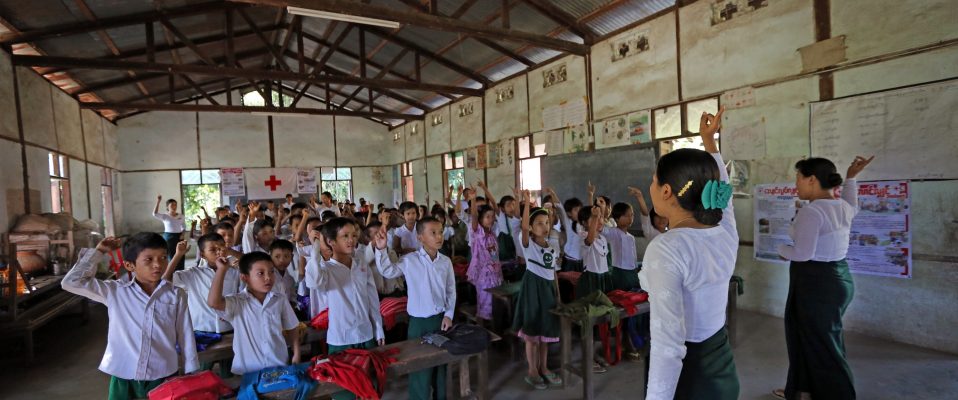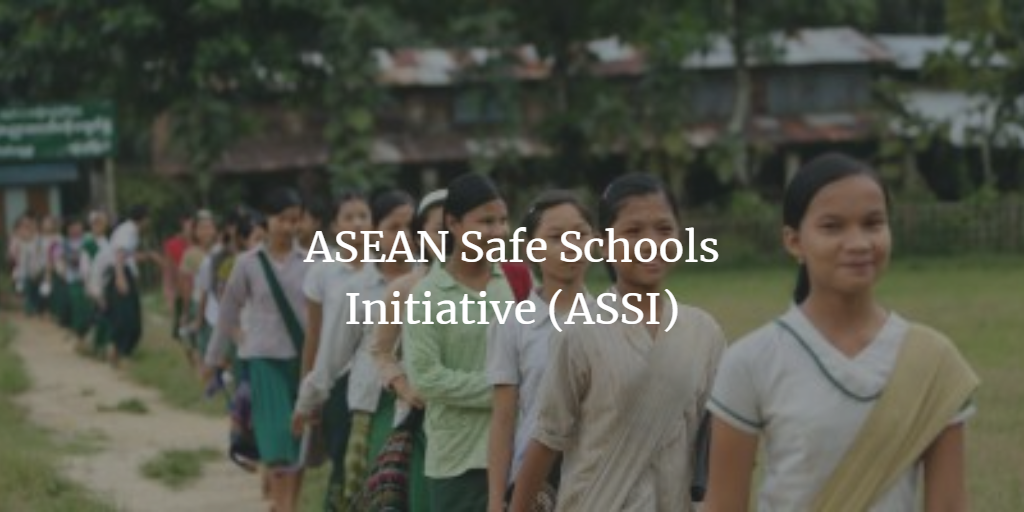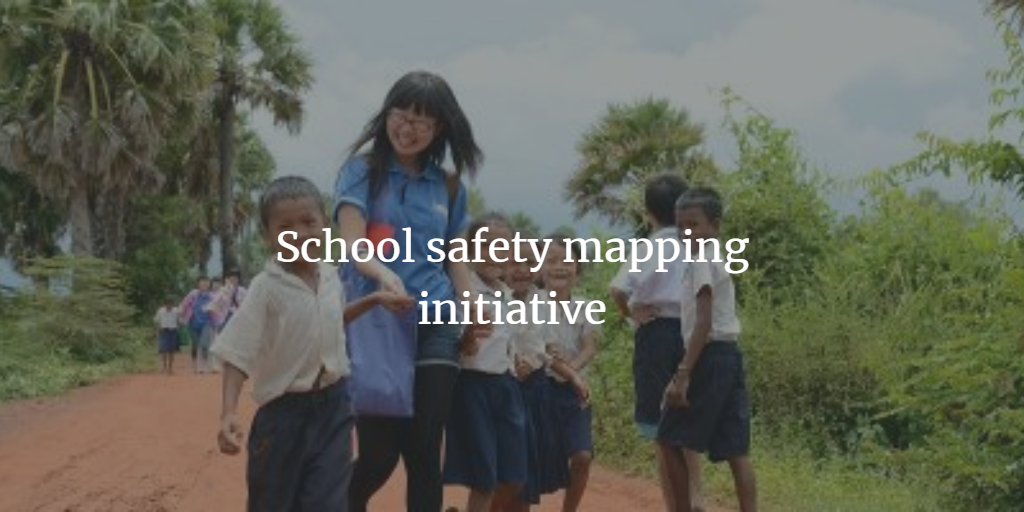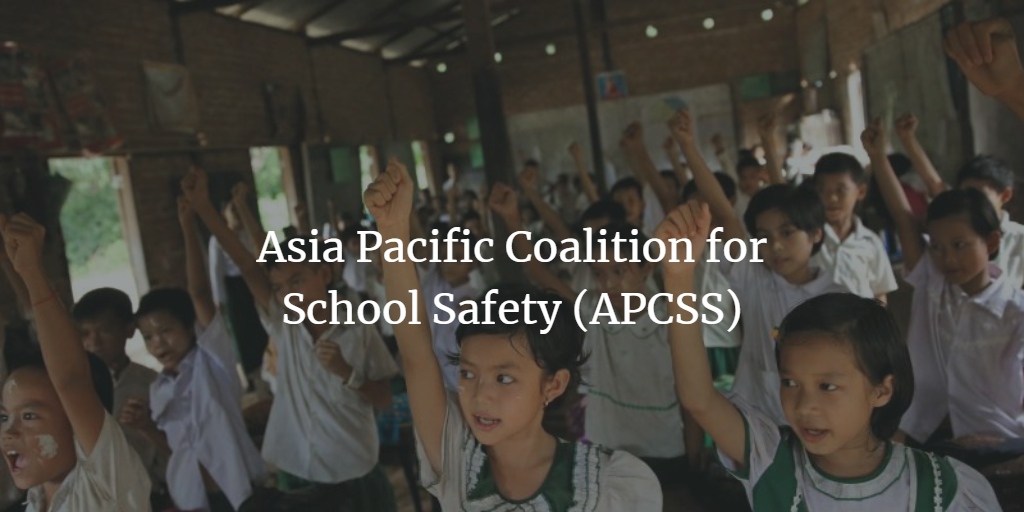The regional perspective
The National Red Cross and Red Crescent Societies from Southeast Asia have been implementing a wide range of school-based activities in areas such as disaster risk reduction, first aid, hygiene promotion, health promotion, road safety, and water and sanitation. The activities are run through their Disaster Management and Health programmes.
In support of the global and regional school safety initiatives, the IFRC has been supporting the ongoing work of National Societies in their role as auxiliaries to local authorities, collaborating with National Disaster Management Offices and Ministries of Education.
Global and regional commitments
Sendai Framework for Disaster Risk Reduction 2015-2030 recognizes children and youth as agents of change and calls upon all heads of states and governments, ministers and all stakeholders to give children and youth the space and modalities to contribute to disaster risk reduction, in accordance with legislation, national practice and educational curricula.
The Asian Ministerial Conferences for Disaster Risk Reduction (AMCDRR) called upon all stakeholders to both recognize the meaningful role of youth and children in school safety and institutionalize the participation of children, adolescents and youths in school-based DRR activities.
ASEAN has also become increasingly active in school safety in recent years with the launch of the ASEAN Safe Schools Initiative (ASSI) in 2013, under the ASEAN Agreement on Disaster Management and Emergency Response (AADMER).
ASSI has become a priority for the AADMER Work Programme 2010-2015 under the purview of the ASEAN Committee on Disaster Management (ACDM) – Prevention and Mitigation Working Group, with the support of civil society organisations. Through ASSI, the ASEAN Common Framework for Comprehensive School Safety (ACFCSS) was developed and endorsed by the ACDM in 2016 to be the guiding principle for ASEAN Member States in the implementation of school safety initiatives in the region, aligned with the global Comprehensive School Safety Framework.
Building upon the regional work in school safety in the recent years, the newly launched AADMER Work Programme 2016-2020 has also taken ASSI as one of the three main outputs of its Priority Programme 2: “Build Safely.” The current AADMER Work Programme encourages the scaling up of school safety implementation in ASEAN countries and the mapping of school safety/DRR in education initiatives in the region to monitor the progress of implementation.
3rd ASEAN Regional Conference on School Safety | 3-4 April 2019 | Bangkok, Thailand
2 April , 2019 - 4 April , 201917th South-East Asia Youth Network Online Meeting | 27 April 2017
27 April , 20172nd ASEAN Safe School Conference | 14-15 February 2017 | Bangkok
14 February , 2017 - 15 February , 2017Launch of School Safety Mapping Initiative by South East Asia Youth Network | 25 January 2017 | Online
25 January , 2017Youth in School Safety Facilitators Training | 5-8 December 2016 | Myanmar Red Cross
5 December , 2016 - 8 December , 2016
e-mail: Disaster Risk Management Delegate, Hung Ha Nguyen, at hungha.nguyen@ifrc.org
Red Cross and Red Crescent Societies working towards school safety
- Brunei Red Crescent Society working for school safety
- Cambodian Red Cross working for school safety
- Cruz Vermelha de Timor-Leste working for school safety
- Indonesian Red Cross Society working for school safety
- Lao Red Cross Society working for school safety
- Malaysian Red Crescent working for school safety
- Myanmar Red Cross working for school safety
- Philippine Red Cross working for school safety
- Singapore Red Cross Society working for school safety
- Thai Red Cross Society Working for school safety
- Viet Nam Red Cross Society Working for school safety
Guiding documents
- Public awareness and public education for disaster risk reduction (2nd edition): Action-oriented key messages for households and schools (IFRC, 2018)
- Asia-Pacific Coalition for School Safety (APCSS)’s statement at 2nd ASEAN Conference on School Safety
- Comprehensive school safety, a global framework (UNISDR, GADRRRES, Dec 2014)
- Handbook for a School-based Risk Reduction Initiative (IFRC, 2015)
- Children in disasters – Games and guidelines to engage youth in risk reduction (IFRC, 2010)
- Engaging in the ASEAN School Safety Initiative (ASSI) (IFRC, 2015)
More resources
- School Safety in Myanmar infographics
- Disaster Preparedness for Safer School Project in Bangladesh – Lessons Learned (brief)
- Disaster Preparedness for Safer School Project in Bangladesh – Evaluations Findings (brief)
- Integrated School Flood Preparedness Program – Malaysian Red Crescent Societies
- Youth Facilitator’s Guide – Youth for School Safety (YSS) pilot version
- Youth Empowerment in School Based Disaster Risk Reduction with a tool of youth in school safety (YSS) in Myanmar
- Disaster Preparedness for Safer Schools Project in Nepal – Most Significant Change (brief)
- Disaster Preparedness for Safer Schools Project in Nepal – Evaluation Findings (brief)
More resources
- Comic: Protecting communities – Prevention of mosquito borne diseases
- Comic: Protecting communities – Malaria prevention
- Comic: Preparing for disasters – Drought
- Comic: Preparing for disasters – Earthquake
- Comic: Preparing for disasters – Fire
- Comic: Preparing for disasters – Flood
- Comic: Preparing for disasters – Hygiene promotion
- Comic: Preparing for disasters – Tsunami
- Comic: Preparing for disasters – Typhoon and cyclone
- Comic: Protecting communities – Malaria prevention
- Malaria Infographics in Southeast Asia
Resources from National Societies
- Get Ready for Disasters: Workbook for Primary Students
- Get Ready for Disasters: Workbook for Intermediate Students
- Get Ready for Disasters: Flip chart for Volunteers
- Get Ready for Disasters: Flip chart for Teachers
- Risk Land Board Game
- Be Prepared for Natural Disasters with Mr. Radar (comic book)
- Be Prepared with Mr. Radar (information poster on multi-hazards)
- Be Prepared for Natural Disaster with Mr. Radar (video)
- Snake board game
![]()





